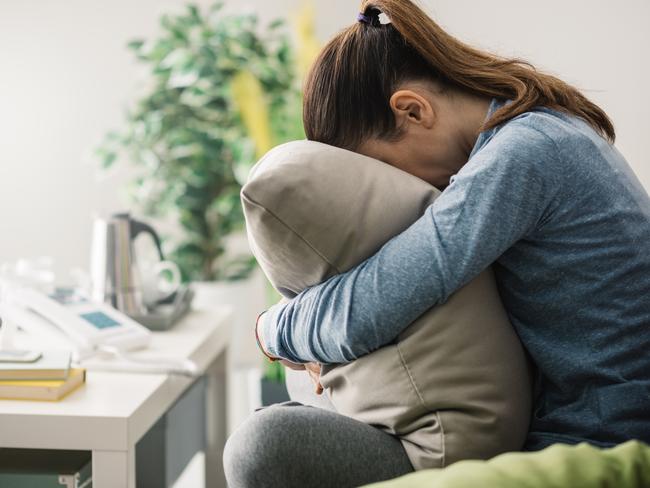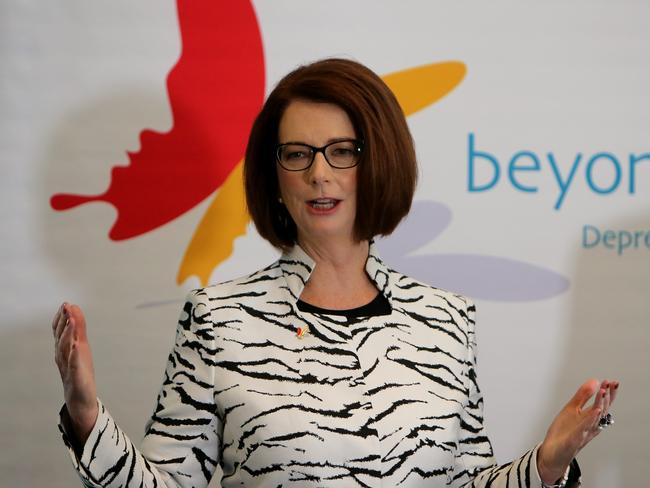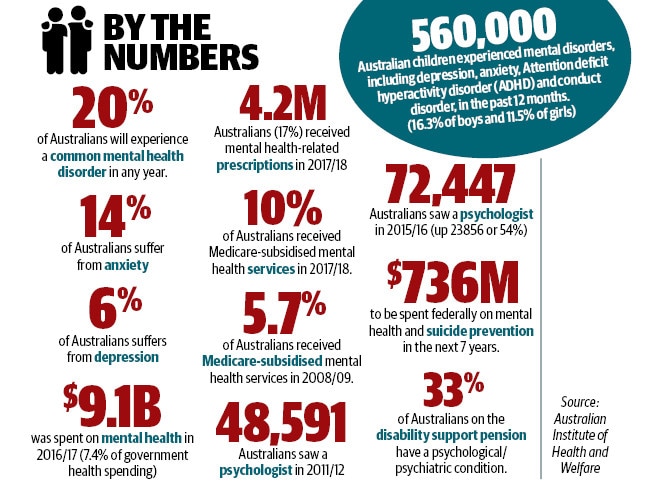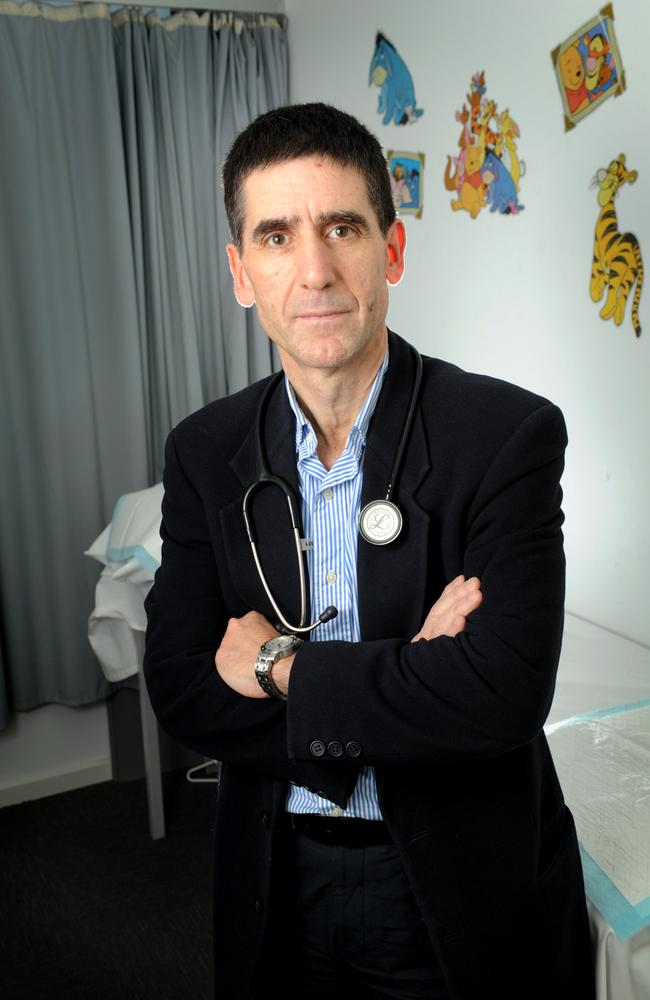Experts in controversial warning ‘not all downs are depression’
Psychologists warn that “normal” sadness and anxiety can be over-diagnosed as depression – as teachers call on parents to make kids more emotionally resilient.
QLD News
Don't miss out on the headlines from QLD News. Followed categories will be added to My News.
PSYCHOLOGISTS have warned that too many Australians feeling “normal emotions’’ of sadness and disappointment are diagnosing themselves as depressed.
The College of Clinical Psychologists at the Australian Psychological Society (APS) has told a government inquiry people need to see “worry, sadness and frustration as a normal part of life’’.
“The public should be provided with more public health messages that normalise unwanted emotions,’’ the College has told the Productivity Commission’s inquiry into mental health.
Ruby Rose opens up about depression and past suicide attempts
Former H & A star reveals battle with depression that sparked new documentary
“As early as primary school, children express concern about their mental health and self-diagnose anxiety and depression rather than see worry, sadness and frustration as a normal part of life.’’

In a highly controversial statement, the college singled out Beyond Blue, the mental health charity chaired by former prime minister Julie Gillard, for “pathologising’’ normal anxiety and sadness, and increasing reports of depression in the community.
But it was forced to back down after Beyond Blue hit back, urging people to seek support when feelings become “problematic’’.
An Australian Psychological Society spokeswoman said yesterday the Productivity Commission would be asked to take down the submission due to an “error” in naming Beyond Blue.
The debate blew up amid a national mental health crisis, with rising rates of depression and anxiety and 3046 suicides, including 100 children, last year.

One in 10 Australians used Medicare for mental health visits to doctors, psychologists and psychiatrists last year — with one in seven Australians suffering from anxiety and one in 16 diagnosed with depression.
But College of Clinical Psychologists chairman Brendan Meagher said the line between sadness and depression was “blurred’’.
“Those lines can become very blurred between stressful events and feeling sad, and clinical depression,’’ he told The Sunday-Mail yesterday.
“There is a difference between being sad and depressed.
“One of the concerns is that people will go through a situation that is understandably unpleasant because it is a sad or stressful situation, but they self-diagnose as having depression.’’
Dr Meagher said sadness and anxiety could be a “normal healthy and understandable reaction to situations’’.

“If (people) think they have a significant mental illness that needs to be treated medically, they are not necessarily going to be responding to and getting over a situation as quickly as they might be,’’ he said.
“That has an impact on resilience.
“If someone’s understandably grieving because they’ve lost a family member, it doesn’t necessarily mean they need psychological treatment.’’
The contentious comments come as teachers point the finger at over-protective parents for raising “less resilient’’ children.
“In the school setting, teachers are sensing that students have less resilience than in previous decades,’’ the Australian Professional Teachers’ Association has told a federal government review of education.
TIPS TO IMPROVE YOUR MOOD
Speak to yourself kindly
Negative self-talk can make our mood worse by reinforcing how bad we feel. Notice what you say to yourself and work on more helpful, calming and encouraging self-talk such as: “This is a rough period but it will pass.”
Keep things in perspective
Tale a step back and look at something that is upsetting you. Ask yourself: Am I getting ahead of myself and assuming something bad will happen when I really don’t know the outcome? How likely is the outcome? If the worst were to happen, what could I do about it?
Get active
Make a list of things you enjoy – exercise, reading, listening to music or spending time with a friend. Then make a list of things that would feel good to get done, like household chores, errands, work tasks or study. Make time each day to do a task from each list.
Be mindful and relax
Relaxation, meditation or mindfulness allows your body and nervous system to settle and re-adjust to a calm state.
Look after your health
Eat well, exercise, and avoid using alcohol, tobacco or drugs to cope when you find things difficult.
Source: Australian Psychological Society
“Perhaps this is associated with a decline of community support networks or the tendency of parents and carers to protect their children from difficult experiences and failure.
“Perhaps this trend is associated with the rapid rate of change in society.’’
The teachers’ association says kids must be given the chance to “grow from difficult situations in order to build resilience’’.
“Resilient students are more likely to take calculated risks, try new things, be happier and learn more effectively,’’ it says in its submission.
The College of Clinical Psychologists called for advertising campaigns to focus more on mental health, instead of mental illness — and singled out the Beyond Blue charity.
“The most prominent existing public health messages about mental health — eg from services such as Beyond Blue — pathologises normal experiences of anxiety and sadness, disappointment, grief, exhaustion (all conflated with clinical depression) thereby increasing the number of reports of anxiety and depression in the community,’’ it states in its submission to the Productivity Commission inquiry, which is due to report at the end of this month.

“Health promotion messages which assist people to see emotional health fluctuations as being a normal part of emotional expression and experience will reduce the escalating anxiety and depression which has resulted from the previous decades of ‘diagnose yourself and get medical treatment’ type of health promotion messages.’’
Beyond Blue yesterday said it did not promote self-diagnosis.
“Claims that we do not make these distinctions are reckless and inaccurate, and do little to support efforts to end stigma and encourage open conversations and help-seeking,’’ Beyond Blue chief executive Georgie Harman said yesterday.
“Beyond Blue encourages people to recognise when their feelings and thoughts may be becoming problematic, and to then seek appropriate support.’’
Dr Meagher said that Beyond Blue “does some really good work’’.
“I would like to see more (emphasis on) … how can we become a more mentally healthy community rather than focus on mental illness,’’ he said.
“Part of that could be teaching people to be able to come to terms with normal stressful events in their life and not pathologise those.’’
Australian Medical Association president Tony Bartone urged people to see their doctor if they are worried about sadness or anxiety.
“Sometimes it’s a normal part of dealing with life’s trials and tribulations, and time and persistence will see you through,’’ he said.
“But if we tell people to toughen up and deal with it, we’ll end up with people being missed and situations becoming more complex, and delays in diagnosis and treatment.
“Some people find the stresses and pressures of the fast world we live in means they can’t differentiate between a normal reaction and something more sinister.’’
WHERE TO GET HELP
- Lifeline 13 11 14
- Kids Help Line 1800 551 800
- Beyond Blue 1300 224 636
- Headspace.org.au



